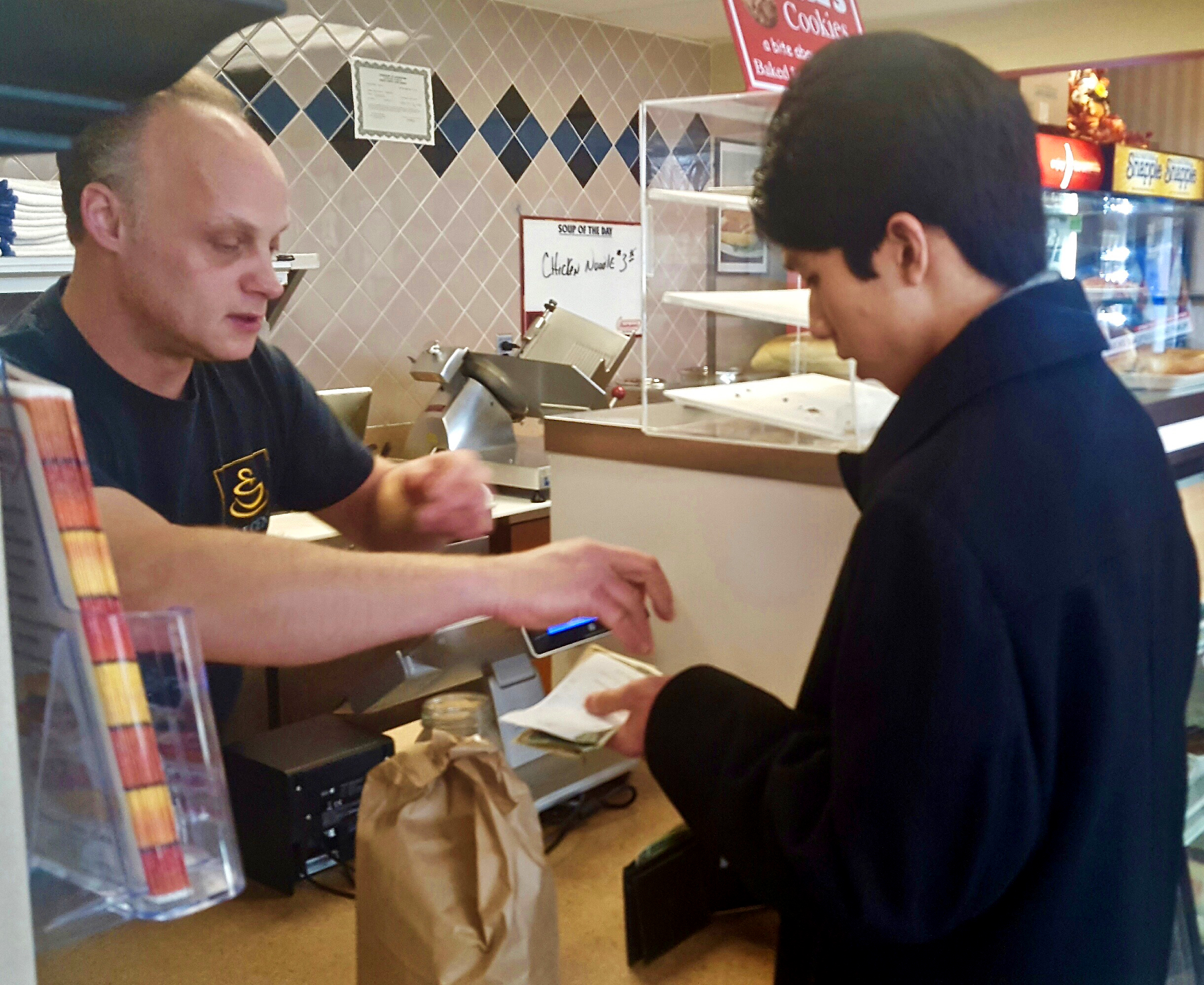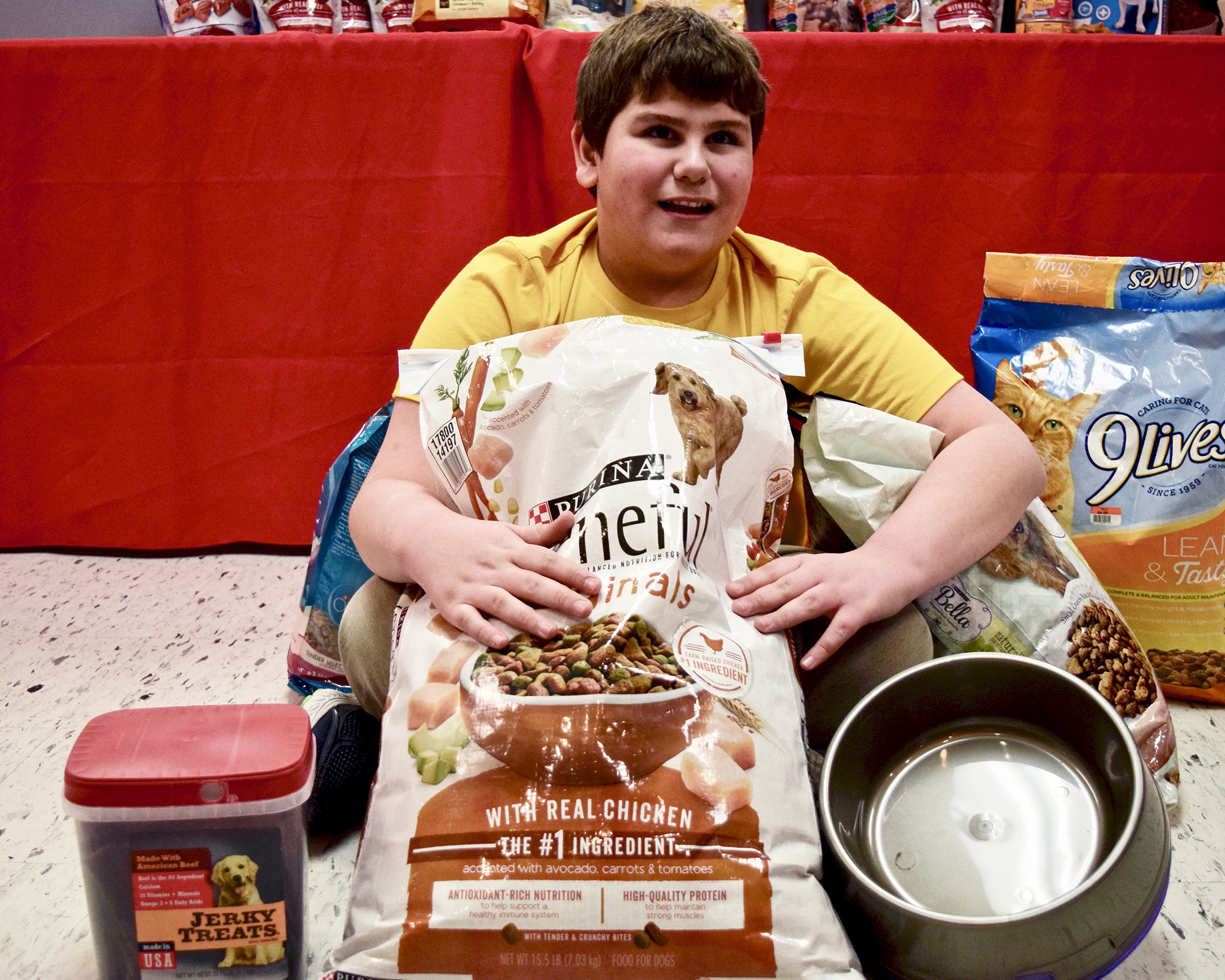For children on the autism spectrum, learning to navigate public spaces is a challenge. Academy360 helps students prepare for life beyond the classroom with its Community-Based Instruction (CBI) program, which brings them into the community to practice functional skills and become familiar with real-world scenarios.
Designed for Middle School students and older, CBI is a form of instruction that takes place in the natural environment where a skill is expected to be performed, such as shopping centers, restaurants, supermarkets and more. It is an evidence-based strategy that can lead to greater post-school success in living as independently as possible.
Guided by teachers and aides, CBI excursions give students the opportunity to practice many life skills in a more structured environment, breaking tasks into discrete steps they can master through time and practice.
HOW IT WORKS

“They learn how to act in the community as a consumer,” says Gina Catania, Academy360 Lower School principal. “They’re learning the soft skills needed in department stores, supermarkets, and restaurants: finding the right person to ask for help, learning how to wait online, how to pay for items.”
On a supermarket visit, students practice using a shopping list to find their groceries: Looking at aisle signs for where their items can be found and then scanning shelves to locate them. These basic steps alone reinforce lessons in focusing on tasks, observation, reading comprehension, and much more.
“Going on these trips, I could list a hundred different skills that they are working on,” says Cheryl Spinella, a teacher at A360 LS. “The types of things that when we go to a store we don’t really think about,” Cheryl adds. “Something as simple as pushing a cart and navigating around the store. Not hitting people with a shopping cart!” she laughs. “These are things we go over every week.”
Trips begin before they even leave the school, with everyone checking their wallet to count how much money they have and that they have their list. Once they’ve finished shopping there’s still so much more to cover: Taking their items to the register, how to talk to the cashier, putting the items in a bag and taking it with them.
“People just assume everyone knows these skills, but for these students even to know where to put their wallet is a lesson. Learning to keep important items close to them is a lesson,” says Cheryl.
That’s all in addition to the biggest part of being a consumer: handling the money.
Students learn the “next dollar” procedure in math. They have a certain amount of bills, provided by their parents, in their wallets. If their total is $3.70, they’re taught to round up and understand they need to give the cashier $4.00.
For some it’s easier to use a debit card, so they also practice the steps involved in inserting the card, using the pin number and following instructions.
“It’s important they understand money-handling is a step in making any purchase,” explains Cheryl. “We take the specific skills learned in the classroom and learn how to generalize them to many different stores, many different registers.”
And it’s not just the mechanics of shopping or dining that they practice. Parking lots can pose a big problem for children on the spectrum. Learning to not to run, to look for cars and obey signs. It takes a lot of repetition to acquire those skills, and a lesson that’s constantly reinforced
CBI benefits the community as well, Cheryl feels. “Merchants get excited too. On the trips, teachers can do a little community outreach with employees and other shoppers, answering questions and explaining what we’re doing,” she says.
And A360 students make the most of what the area has to offer! Some of the many places they’ve visited includes Foodtown, Shoprite, Whole Foods, Dollar Tree, Amazing Savings, 5-Below, the Willowbrook Mall, Let’s Yo!, The Pilgrim Diner, The Verona Diner, Barnes and Nobles, Words Book Store, Verona Public Library, Petco, K-Mart – they certainly get around!
“We sometimes repeat where we’re going so students can become familiar with a location and we can see growth,” says Gina. “We collect data so we can evaluate how they’re doing with skill acquisition.”
IN THE CLASSROOM

Teachers tie the trip thematically to something the students can discuss and prepare for.
“The cool thing is that we want it to be as functional as possible,” Cheryl explains. “We want the kids to understand the reason for going to a certain store, not just to get them to ‘a’ store.”
These are just a few of the lessons:
- In December the theme was “Santa Paws.” Students went to PetCo and bought dog and cat food, toys, and other items to donate to animals in a local community shelter.
- On Valentine’s Day, each student had a Secret Valentine. Before heading out to the store, they planned what they could buy for them.
- For National Creativity Month, the students went to Michael’s Craft Store and purchased kits to make things for class projects.
On the morning of a CBI outing, students participate in a language program, reviewing words associated with where the class is going. There’s conversation about what they’ll see at the store, what is sold there, and who they will see: cashiers, store clerks, bakers, produce people. The discussions build up a lot of excitement in the classroom.
Then, when the class returns to school, they talk about what they did and what they saw. They make sure they have all of their belongings – their backpack, wallet, money, receipt, and what they bought.
And the best part: it’s a lot of fun!
“The students really enjoy the trips! It’s a day out of school with their classmates, they’re buying their own things and bringing things home for mom and dad,” Cheryl says with a smile. “ They’re really excited to be out doing things for themselves and being independent.”
PRE-SCHOOL/ELEMENTARY PREPARATION
CBI trips begin in the Middle School, but practice with getting a cart, waiting online, paying money at a register begins long before they get there. It’s an ongoing practice that starts as early as pre-kindergarten, says Tara Hayek, Academy360 Lower School Vice Principal.
“The little guys begin doing a lot of self-help skills, preparing them to being independent.
Toilet training, putting on their own coats, getting their backpacks, putting their things together,” says Tara. “From there we move on to pre-readiness experiences, sort of a CBI-light.”
Life Skills classes in the Elementary classes have three components: consumerism, culinary and housekeeping. Over the course of each week, students shop for items in the school store to use in a recipe; prepare the recipe; and clean up after themselves in the Life Skills apartment.
In the school store, students learn the basics of shopping: there are mini carts, registers and debit machines. Students are also learning how to identify bills and coins, and increase vocabulary related to the experience. Most importantly, they’re familiarizing themselves with the chain of events.
Lessons are tailored to each student’s skill level: some use text lists to shop for items, others use visual cues. Some students are more adept with cash money, others may feel more comfortable using a debit card.
“Some need more support in culinary, or housekeeping, or shopping, but all participate,” says Tara. “Sometimes it takes years, but everyone gets there.”
And by the time students reach Middle School, they’re ready to take those building blocks and begin experiencing being out in the community and doing things for themselves.
Ultimately, wherever they may go, CBI hopefully makes navigating the world less stressful for students and more fun now and in the future.
“CBI gives kids such a great opportunity to practice a lot of life skills in a structured environment that’s outside the classroom. So many lessons are learned before, during and after the outings,” concludes Cheryl. “It’s good for kids to have that experience in different parts of the community.”
The program continues in A360’s Upper School, with students continuing to practice skills in the community to reinforce the lessons they’ve learned and to broaden their familiarity with the world they will function in as they grow older.

